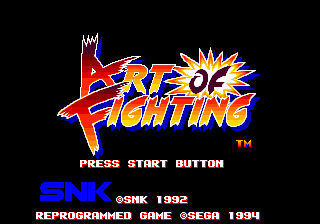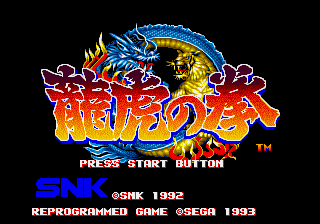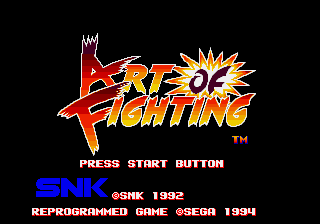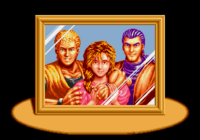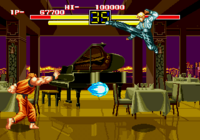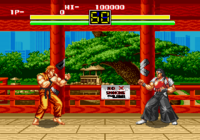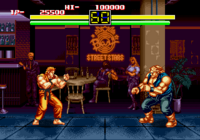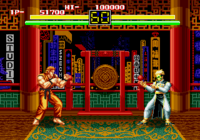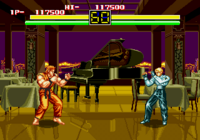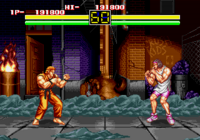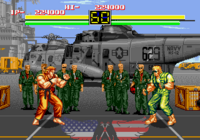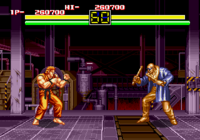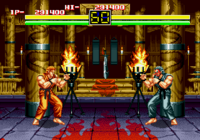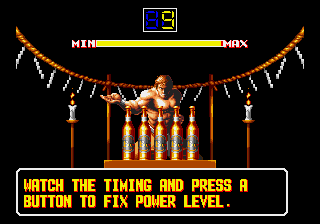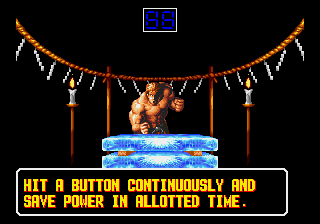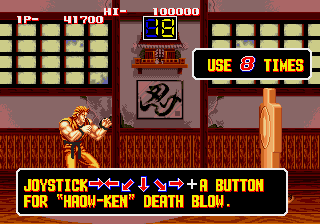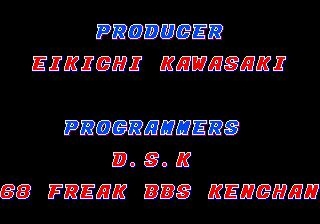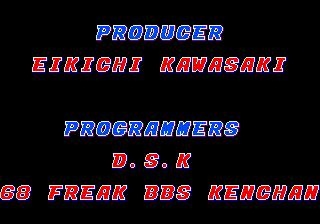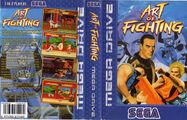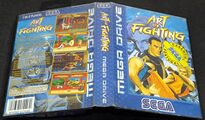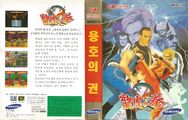Art of Fighting
From Sega Retro
| ||||||||||||||||||||||||||||||||||||||||
| Art of Fighting | ||||||||||||||||||||||||||||||||||||||||
|---|---|---|---|---|---|---|---|---|---|---|---|---|---|---|---|---|---|---|---|---|---|---|---|---|---|---|---|---|---|---|---|---|---|---|---|---|---|---|---|---|
| System(s): Sega Mega Drive | ||||||||||||||||||||||||||||||||||||||||
| Publisher: Sega | ||||||||||||||||||||||||||||||||||||||||
| Developer: SNK | ||||||||||||||||||||||||||||||||||||||||
| Distributor: Ecofilmes (PT), Samsung (KR) | ||||||||||||||||||||||||||||||||||||||||
| Licensor: SNK | ||||||||||||||||||||||||||||||||||||||||
| Original system(s): Neo Geo | ||||||||||||||||||||||||||||||||||||||||
| Sound driver: SMPS Z80 | ||||||||||||||||||||||||||||||||||||||||
| Peripherals supported: Six Button Control Pad | ||||||||||||||||||||||||||||||||||||||||
| Genre: Action[1][2] | ||||||||||||||||||||||||||||||||||||||||
| Number of players: 1-2 | ||||||||||||||||||||||||||||||||||||||||
| ||||||||||||||||||||||||||||||||||||||||
|
Art of Fighting, known as Ryuuko no Ken (龍虎の拳) in Japan (and South Korea), is a fighting game by SNK, originally released for the Neo Geo in 1992. It was ported to the Sega Mega Drive by SNK and published by Sega in 1994.
Art of Fighting is the second fighting game to be developed by SNK, following Fatal Fury (which co-exists in the same fictional universe).
Contents
Story
Taking place in South Town in 1978, Ryo Sakazaki and Robert Garcia set out to find Ryo's sister, Yuri, who has been kidnapped by the crime boss Mr. Big.
Gameplay
Art of Fighting is a story-driven fighting game where players control fighters Ryo Sakazaki or Robert Garcia, traveling around the fictional city of South Town in search of Ryo's captured sister, Yuri. The player has to defeat eight other fighters with their own unique fighting styles to finish the game. It plays similarly to other fighting games, such as Fatal Fury or Street Fighter II. Players face a variety of opponents in matches fought to the best of three rounds. Matches are decided by the computer if they conclude four rounds without a winner. There are multiple characters, each having a unique fighting style and set of special techniques.
Unlike later entries, only Ryo and Robert are selectable in the single-player story mode, though all characters can be controlled in the two-player versus mode. There are two difficulty levels for the story mode (Normal and Hard), and the game can only be continued twice.
Characters move with ![]() and
and ![]() and dash with
and dash with ![]()
![]() and
and ![]()
![]() . They jump with
. They jump with ![]() and flip back and forth with
and flip back and forth with ![]() and
and ![]() . They crouch with
. They crouch with ![]() . Characters can punch with
. Characters can punch with ![]() and kick with
and kick with ![]() . They perform a low kick with
. They perform a low kick with ![]() +
+![]() , which can sweep opponents. Throwing is done by holding the D-Pad toward the opponent while pressing
, which can sweep opponents. Throwing is done by holding the D-Pad toward the opponent while pressing ![]() (but not all characters can throw). Blocking is done by holding the D-Pad away from the opponent while standing or crouching.
(but not all characters can throw). Blocking is done by holding the D-Pad away from the opponent while standing or crouching.
In addition to the normal assortment of punches and kicks, characters can also perform special moves using particular button combinations. However, these special moves deplete the character's spirit gauge. The spirit gauge is initially green but becomes yellow or red as its level decreases. The effectiveness of the character's special moves decreases at each threshold, decreasing in power, speed, or range depending on the technique. The spirit gauge replenishes automatically over time and can be refilled by holding ![]() ,
, ![]() or
or ![]() .
.
Ryo and Robert have two additional special attacks available to them. The first is a "Super Death Blow" that can be learned from winning a bonus game in the single-player mode (but is immediately available in the two-player mode). This is a more powerful attack that costs a large amount of spirit. They also have desperation attacks, dubbed "Death Blows," which are special combination attacks that can only be executed when the character is below 20% vitality.
When using the standard three-button controller, the character can perform a stronger punch by pressing and holding ![]() briefly or a stronger kick by pressing and holding
briefly or a stronger kick by pressing and holding ![]() briefly. The character can provoke the opponent with
briefly. The character can provoke the opponent with ![]() . This performs a taunt that drains the opponent's spirit gauge. Some characters can jump off the edge of the screen with
. This performs a taunt that drains the opponent's spirit gauge. Some characters can jump off the edge of the screen with ![]() while in midair.
while in midair.
When using a Six Button Control Pad, the character can perform a stronger attack with ![]() . The attack is a punch if the character's last attack was a punch or a kick if the character's last attack was a kick. The character can provoke the opponent with
. The attack is a punch if the character's last attack was a punch or a kick if the character's last attack was a kick. The character can provoke the opponent with ![]() ,
, ![]() , or
, or ![]() . This performs a taunt that drains the opponent's spirit gauge. Some characters can jump off the edge of the screen with
. This performs a taunt that drains the opponent's spirit gauge. Some characters can jump off the edge of the screen with ![]() ,
, ![]() , or
, or ![]() while in midair.
while in midair.
There are three different alternate controller schemes available in the options that rearrange the functions of the ![]() ,
, ![]() , and
, and ![]() buttons. When using a six-button control pad, there is an additional fourth scheme, called "Type-D," that sets
buttons. When using a six-button control pad, there is an additional fourth scheme, called "Type-D," that sets ![]() and
and ![]() to normal and strong punches,
to normal and strong punches, ![]() and
and ![]() to normal and strong kicks, and
to normal and strong kicks, and ![]() and
and ![]() to provoke.
to provoke.
Characters
Note: Move lists assume that the character is facing right. When facing left, ![]() and
and ![]() should be reversed.
should be reversed.
| P | Punch |
| K | Kick |
Ryo and Robert are the only playable characters in the single-player mode, but all characters are playable in two-player matches.
Ryo Sakazaki, Robert Garcia, Jack Turner, and Mr. Karate can perform throws. All characters except Jack Turner, Micky Rogers, and Mr. Big can wall jump.
Stages
Ryo or Robert face eight opponents in order in the single-player story mode, each fighting in a different stage representing a different part of South Town. Players can choose the stage for two-player versus matches from the title screen.
Bonus games
In the single-player mode, after every second fight, the player can choose one of three types of bonus games to play. Successfully completing a bonus game awards an upgrade.
| Bottle Cut | |
|---|---|
| The goal is to cut the necks off of five bottles sitting on a table. The power gauge fluctuates high and low. Pressing | |
| Ice Pillar Smash | |
| The goal is to build up enough strength to smash through five blocks of ice. Pressing | |
| Initiate Super Death Blow | |
| The character must execute a super move, the Haoh Shoukou Ken (called the "Haow-Ken" in-game), a specific number of times (depending on the difficulty level). If successfully completed, the move becomes usable in the rest of the game. This is also the only bonus game that cannot be chosen again once successfully completed. While this move must be learned by completing the bonus game in the story mode, it is available by default in the two-player mode. |
History
Legacy
Art of Fighting was a significant release for SNK and an influential release for the fighting genre. It introduced a number of conventions that would be seen in later fighting games, including a zooming effect and desperation moves, both famously reused in Samurai Shodown and other Neo Geo fighting games. It also introduced taunting, which would reappear in numerous subsequent fighting games. Alongside Fatal Fury, it pioneered a story-driven approach to the single-player mode. The concept of a spirit gauge that drains as the fighter uses special moves, with taunts that can be used to drain the opponent's spirit, was reused in Sega of America's Eternal Champions games.
The game received two sequels. Art of Fighting 2 was released in 1994 for the Neo Geo MVS and AES, the Neo Geo CD, and the Super Famicom. Art of Fighting 3: The Path of the Warrior was released in 1996 for the Neo Geo MVS and AES and Neo Geo CD. Neither game was ported to a Sega console.
Characters from Art of Fighting have featured prominently in the King of Fighters and Capcom vs. SNK games. Ryo Sakazaki also features as a secret opponent in Fatal Fury Special (and a playable character in the home versions).
The Street Fighter character Dan Hibiki was created as a parody of Ryo Sakazaki and Robert Garcia, whom Capcom saw as derivative of their own characters Ryu and Ken. Dan's ending in Marvel Super Heroes vs. Street Fighter is a parody of the ending of Art of Fighting.
Versions
Art of Fighting was designed in part to take advantage of the relatively high technical specifications of the Neo Geo hardware, demonstrating very large sprites and a unique camera system which appears to zoom in and out of play (in a similar manner to what most 3D fighting games achieved some years later). The game also features some narration from the chosen fighter in between stages.
On the Mega Drive, all of these features are pared back, with the zooming effect removed entirely. Character and background sprites are noticeably smaller and much of the sampled speech is removed. However, unlike the original arcade game, which was limited to four buttons, the actions can be spread to six buttons.
Enemy AI differs between the Japanese and Western versions, with the latter seeing generally stronger opponents. The difficulty in both is reduced from the Neo Geo versions. Mr. Big and Mr. Karate are also available in the two-player versus mode from the outset in the Mega Drive version.
A raster scrolling effect was added for the layer of dust and smoke found in Mickey's stage in the Western version. This was not present in the Japanese release or the Neo Geo original.
The Super NES conversion retains the zooming effect of the Neo Geo game (though with less zoom distance) and adds desperation moves for all of the characters (rather than only Ryo and Robert).
While lacking the graphical and audio fidelity of its Neo Geo AES counterpart, the Mega Drive version of Art of Fighting, like most Neo Geo conversions of the era, retailed at a much lower price point.
Localised names
| Language | Localised Name | English Translation |
|---|---|---|
| English | Art of Fighting | Art of Fighting |
| English (US) | Art of Fighting | Art of Fighting |
| Japanese | 龍虎の拳 | Ryuuko no Ken |
Production credits
Japanese version
- Producer: Eikichi Kawasaki
- Programmers: D.S.K, 68 Freak BBS Kenchan
- Technical Support: Mr. Yuki29, Star Light ♥, Asami Don
- Designer: M.Mioshi, SSS, SK, Shodown, X.X.X
- Sound: Jojou ha Kitapy, Yamapy I
- Planner: K.I
- Special Thanks: Y.O, Ya Shu!, Ken Kimra, Tabei Chan, Kamata San, Sanjyou, Yamatan GT X, Speaker.R, Wan Wan Pochi Kawai, 68 Freak BBS Z'N, EP82Boy, Atsushi, Sekotch, Stg.Oyaji, Yuritan, Sasa, Nakata21, Kei Fukunaga and... All SNK Staff!
- Presented by: SNK
North American version
- Producer: Eikichi Kawasaki
- Programmers: Cross Moon D.S.K, 68 Freak BBS Kenchan
- Technical Support: Mr. Yuki 29, Asami Don, Speaker.R
- Designer: M.Mioshi, SSS, SK, Shodown, X.X.X
- Sound: Jojou ha Kitapy, Yamapy I
- Planner: K.Chan MK2
- Special Thanks: Y.O, Ya Shu!, Ken Kimra, Tabei Chan, Kamata San, Sanjyou, Yamatan GT X, Vow Wow John Kawai, 68 Freak BBS Z'N, EP82Boy, Atsushi, Sekotch, Stg.Oyaji, Yuritan, Sasa, Nakata21, Kei Fukunaga, Kura San, Oh!Buchi, Jaro, Hirotan, 'Art of Fighting' Team All Staff, and... All SNK Staff!
- Presented by: SNK
European version
- Producer: Eikichi Kawasaki
- Programmers: D.S.K, 68 Freak BBS Kenchan
- Technical Support: Mr. Yuki29, Star Light ♥, Asami Don
- Designer: M.Mioshi, SSS, SK, Shodown, X.X.X
- Sound: Jojou ha Kitapy, Yamapy I
- Planner: K.I
- Special Thanks: Y.O, Ya Shu!, Ken Kimra, Tabei Chan, Kamata San, Sanjyou, Yamatan GT X, Speaker.R, Vow Wow John Kawai, 68 Freak BBS Z'N, EP82Boy, Atsushi, Sekotch, Stg.Oyaji, Yuritan, Sasa, Nakata21, Kei Fukunaga, and... All SNK Staff!
- Presented by: SNK
Magazine articles
- Main article: Art of Fighting/Magazine articles.
Promotional material
Artwork
Physical scans
| Sega Retro Average | |||||||||||||||||||||||||||||||||||||||||||||||||||||||||||||||||||||||||||||||||||||||||||||||||||||||||||||||||||||||||||||||||||||||||||||||||||||||||||||||||||||||||||||||||||
|---|---|---|---|---|---|---|---|---|---|---|---|---|---|---|---|---|---|---|---|---|---|---|---|---|---|---|---|---|---|---|---|---|---|---|---|---|---|---|---|---|---|---|---|---|---|---|---|---|---|---|---|---|---|---|---|---|---|---|---|---|---|---|---|---|---|---|---|---|---|---|---|---|---|---|---|---|---|---|---|---|---|---|---|---|---|---|---|---|---|---|---|---|---|---|---|---|---|---|---|---|---|---|---|---|---|---|---|---|---|---|---|---|---|---|---|---|---|---|---|---|---|---|---|---|---|---|---|---|---|---|---|---|---|---|---|---|---|---|---|---|---|---|---|---|---|---|---|---|---|---|---|---|---|---|---|---|---|---|---|---|---|---|---|---|---|---|---|---|---|---|---|---|---|---|---|---|---|---|---|
|
| 62 | |
|---|---|
| Based on 35 reviews | |
Technical information
- Main article: Art of Fighting/Technical information.
External links
- Sega of America webpage: Mega Drive
References
NEC Retro has more information related to Ryuuko no Ken
|
- ↑ File:ArtofFighting MD JP Box.jpg
- ↑ 2.0 2.1 https://sega.jp/history/hard/megadrive/software.html (Wayback Machine: 2020-07-20 09:51)
- ↑ Sonic Times, "Volume 2 Number 9: October 1994" (US; 1994-xx-xx), page 8
- ↑ Sega Pro, "April 1994" (UK; 1994-02-24), page 12
- ↑ File:Ryuuko no Ken MD JP credits.pdf
- ↑ File:Art of Fighting MD US credits.pdf
- ↑ File:Art of Fighting MD EU credits.pdf
- ↑ 1700 igr dlya Sega, "" (RU; 2001-xx-xx), page 39
- ↑ Beep! MegaDrive, "February 1994" (JP; 1994-01-08), page 20
- ↑ Console Mania, "Marzo 1994" (IT; 1994-0x-xx), page 30
- ↑ Consoles +, "Mars 1994" (FR; 1994-0x-xx), page 136
- ↑ Cool Gamer, "9" (RU; 2002-10-13), page 18
- ↑ Computer & Video Games, "March 1994" (UK; 1994-02-15), page 33
- ↑ Electronic Games (1992-1995), "September 1994" (US; 1994-0x-xx), page 78
- ↑ Electronic Gaming Monthly, "August 1994" (US; 1994-xx-xx), page 34
- ↑ GameFan, "Volume 2, Issue 4: March 1994" (US; 1994-xx-xx), page 14
- ↑ GamePro, "September 1994" (US; 1994-xx-xx), page 62
- ↑ Gamer, "Noémvrios 1994" (GR; 1994-xx-xx), page 1
- ↑ Gamers, "Juli/August 1994" (DE; 1994-07-01), page 46
- ↑ Hippon Super, "February 1994" (JP; 1994-01-06), page 43
- ↑ Joypad, "Juin 1994" (FR; 1994-0x-xx), page 100
- ↑ MAN!AC, "07/94" (DE; 1994-06-08), page 57
- ↑ Sega Mega Drive Advanced Gaming, "May 1994" (UK; 1994-xx-xx), page 36
- ↑ Mega, "April 1994" (UK; 1994-03-17), page 41
- ↑ Mega Fun, "04/94" (DE; 1994-03-23), page 109
- ↑ Mega Play, "August 1994" (US; 1994-0x-xx), page 60
- ↑ MegaTech, "April 1994" (UK; 1994-03-18), page 20
- ↑ Magazina Igrushek, "1/1996" (RU; 1996-xx-xx), page 55
- ↑ Mean Machines Sega, "April 1994" (UK; 1994-02-28), page 78
- ↑ Play Time, "4/94" (DE; 1994-03-09), page 155
- ↑ Sega Power, "May 1994" (UK; 1994-03-31), page 32
- ↑ Sega Pro, "Easter 1994" (UK; 1994-03-24), page 46
- ↑ Sega Zone, "April 1994" (UK; 1994-03-24), page 50
- ↑ SuperGamePower, "Abril 1994" (BR; 1994-0x-xx), page 24
- ↑ Sega Saturn Magazine, "September 1995" (JP; 1995-08-08), page 87
- ↑ Sonic the Comic, "July 22nd 1994" (UK; 1994-07-09), page 10
- ↑ Super Juegos, "Abril 1994" (ES; 1994-0x-xx), page 32
- ↑ The Zone (AU)The Zone (AU) "Season 1, episode 4" (1994-05-21, ) (+0:00)
- ↑ Todo Sega, "Marzo 1994" (ES; 1994-0x-xx), page 58
- ↑ Tricks 16 bit, "Tricks Sega Gold 800 igr" (RU; 1998-03-20), page 15
- ↑ Video Games, "5/94" (DE; 1994-04-27), page 96
- ↑ VideoGames, "September 1994" (US; 1994-0x-xx), page 73
| Art of Fighting | |
|---|---|
|
Main page | Comparisons | Hidden content | Magazine articles | Video coverage | Reception | Region coding | Technical information | Bootlegs | |
- Six Button Control Pad-compatible games
- 1-2 player games
- JP Mega Drive games
- All JP games
- US Mega Drive games
- All US games
- EU Mega Drive games
- All EU games
- PT Mega Drive games
- All PT games
- UK Mega Drive games
- All UK games
- AU Mega Drive games
- All AU games
- KR Mega Drive games
- All KR games
- Mega Drive games
- 1994 Mega Drive games
- All 1994 games
- Mega Drive action games
- All action games
- All games
- Art of Fighting
- Mega Drive fighting games
